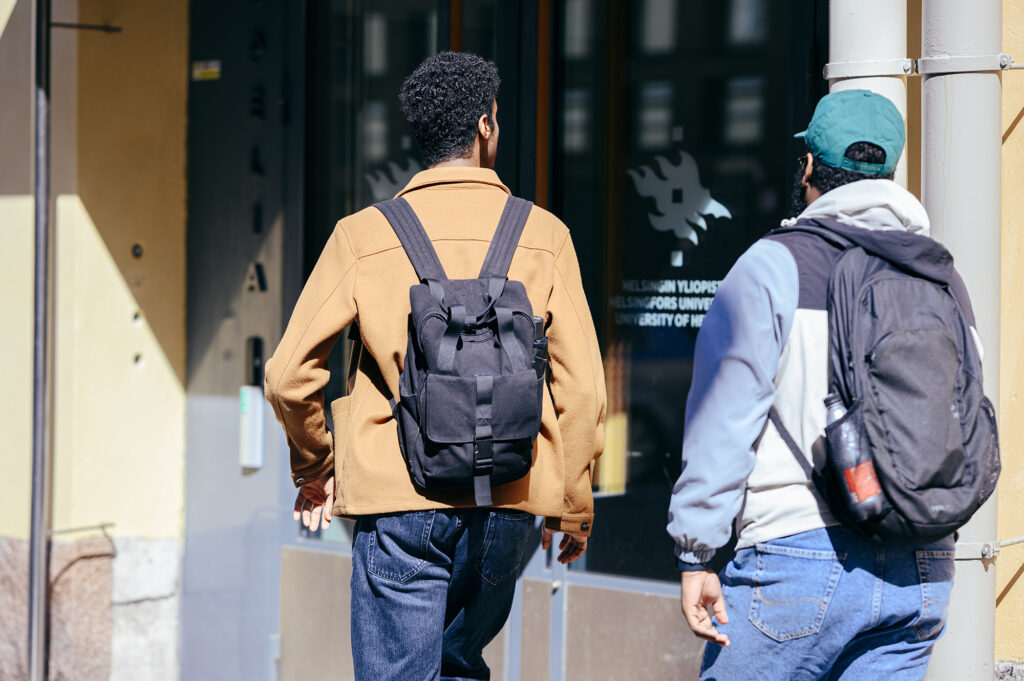Coping with student life in Finland: tips from foreigners

Managing finances and building connections are among the key challenges for international students in Finland, according to interviewees.
Mikhail Tegin
Sercan Alkan
Published 15.05.2025 at 2:54
Updated 15.05.2025 at 3:14
Read the article in Finnish>>>
Studying in a foreign country can be difficult. A new environment, language, bureaucracy and teaching methods all take some time and effort get used to. Satakieli asked five international students what has helped them cope with their studies and daily life in Finland.
Five people shared their advice. They included University of Turku and Åbo Akademi graduates Alisa Belmas from Russia and Noémie Hueber from France, current Åbo Akademi student Patricia Witte from Germany and Ukrainians Yuliia Bobokalo and Kateryna Pavlova, who study at Turku University of Applied Sciences.
All five emphasized two main themes: finances and social connections. The following advice is based on their interviews.
Finances: how to manage expenses
In order to obtain a residence permit in Finland, a foreign student must prove an income of at least 800 euros per month. However, many universities, as well as the Study in Finland website maintained by the Finnish National Agency for Education, recommend preparing for slightly higher monthly expenses – on average 700 to 1200 euros.
Student’s income is often limited, so it’s worth looking for different ways to save money.
Living in student housing is cheaper
Housing is one of the biggest expenses for students. However, in student apartments the rent is on average one fifth lower than the market rent. The price also commonly includes electricity, water and internet costs.
However, the demand for student accommodation is typically high. Alisa’s advice is to act early. When she got accepted at the University of Turku’s Master’s program, she immediately found out, when application period for student housing started.
Submitting an application early does not mean that you would get accommodation immediately though – you often have to wait. The length of the waiting period depends on the type of housing and location. For a typical student apartment, the queue is usually one to two months, but, for example, for family apartments the waiting list can stretch up to six months.
Different housing providers have different rules and requirements for tenants. For example, a student who is just starting school may get an advantage over others, even if he or she applies later.
Alisa submitted her application as soon as the application process opened. A couple of months later, she was offered a rental property.
Take advantage of student benefits
Students can buy many goods and services at a reduced price. The first thing to do is to find out what your institution offers.
Yuliia says that the university has provided her with free Microsoft office programs such as Word, Excel, PowerPoint, as well as Copilot AI assistant. That saves money and helps a lot with her studies, she says.

Alisa recommends joining the student organization of your university. So you can get a student card, which gives you many benefits for the whole period of your studies.
“In Turku, with student card you can have lunch in the student canteen for only 2.95 euros,” she says. Also many other cafés and restaurants offer discounts to students.
In almost every city, a student can get a discount in public transportation. Also sports services such as swimming pools and gyms are cheaper, Yuliia notes.
More discounts can be found on student apps like Frank, Alisa says. There you can get discounts on cultural events or even on electronics.
It’s also worth downloading apps for stores, cafes and restaurants, Kateryna adds. Discounts are available to anyone who has the app, but a student benefits from them too.
Alisa recommends learning about Finnish grocery chains and their bonus programs. Each chain has its own, and a student can save a lot by participating in these programs.
Buy second-hand and volunteer to have fun
If you need to buy something, go to the flea market, Noémie Hueber advises. You can find cheap clothes, furniture and sports equipment there.
She was introduced to flea markets by her Finnish friends, but second hand shopping is also easy to find online. For example, tori.fi is a popular online flea market where you can find second-hand but high-quality items.
If you ask Noémie, having fun is also important part of student life. However, for example concert tickets can be very expensive. Luckily, there’s an alternative.
“There are many festivals in Finland. If you go there as a volunteer, you can enjoy the event for free and meet new people.”
Social connections: how to make friends in Finland?
Student life abroad is always a bit different, no matter the country. Each of the people Satakieli talked with admitted that they had sometimes felt a bit alien or lonely in Finland.
But a lot depends on your own activity. There are many student organizations at universities. By participating in their activities, you can get to know other students.
In addition, it can look good on a CV, Alisa says. The work on the board of a student organization can be listed as a previous position.
Patricia Witte hints about the Erasmus Student Network (ESN). It is the largest student network in Europe and promotes student mobility and internationality of higher education. ESN organizes events where it is easy to meet other international students.
However, it is easy for immigrants to get stuck in an international social circle, Patricia says.
“It’s hard to make friends with Finns if you don’t speak Finnish well.”
Patricia started learning Finnish and Swedish already before she came to Finland and continues to learn the languages alongside her studies. She has also specifically sought out Finnish friends to practise the language.
She joined the Germanists’ student organization of Åbo Academy and, through it, got to know Finnish students and participated many events.
Clubs, cafes, courses
You can also get to know Finns through courses, including the so-called “folk universities” (työväenopisto), says Noemi. The courses are usually very cheap and you can learn different skills: theatre, ceramics, yoga, music.
In almost every city there are language cafes, clubs and hobby groups. By participating in their activities, you can meet people and become part of the community.
If a suitable circle isn’t available, you can always create one yourself, Noemi says.
“Why not? Surely there must be others who are interested in the same things you are!”
Yuliia believes that the main thing is the right attitude.
“Don’t be afraid to test yourself! Sometimes we underestimate our strength, but sometimes we are in the right place at the right time. Everything can work out!”
Useful links for students in Finland
Kela: apply for student aid, housing allowance, etc.
YTHS: health care for university students.
Frank.fi: an app with a student card and a list of discounts across the country.
InfoFinland: basic information for the foreign students.
Erasmus Student Network
Language cafés and integration courses: ask at the library or at the integration services in your town or municipality.